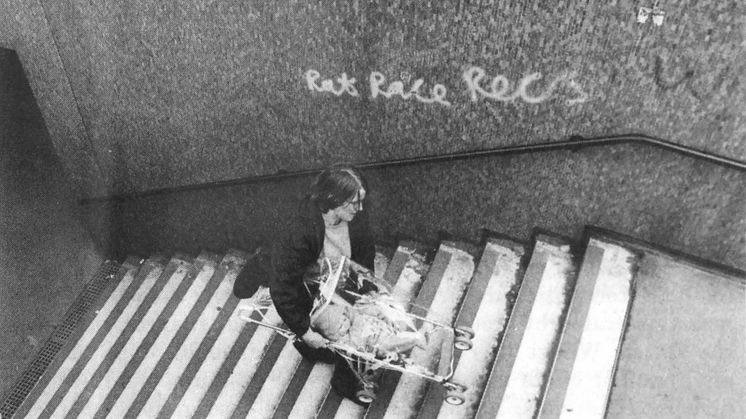
Pressmeddelande -
Press invitation for upcoming exhibition – Chronos: health, access and intimacy
Welcome to the press preview at Tensta konsthall Thursday, March 14 2024 at 10.00 in the presence of the artists and curator Olivia Plender and Cecilia Widenheim. Breakfast is served. RSVP to wasim@tenstakonsthall.se
Participating artists: Jessie Bullivant, Cecilia Germain, Melanie Gilligan, Goldin+Senneby, Jakob Jakobsen, Matrix Feminist Design Co-operative, Park McArthur, Olivia Plender, Ihra Lill Scharning, Vård och värde, and Constantina Zavitsanos.
Based on the feminist architectural group Matrix Feminist Design Co-operative, this spring's exhibition at Tensta konsthall highlights questions about accessibility and who the city and the public space are for. Which body norms and which concept of time have shaped the society we live in? And what can we learn from the disability rights movement that has long demanded access to the city and the built environment?
Works by ten contemporary artists shed light on different aspects of health, access and intimacy. In Park McArthur and Constantina Zavitsanos’ video Score for Carolyn, a slow metallic voice resonates about existence and presence, about being late and about trying to be on time. Goldin+Senneby asks whether the view of "disability" is ultimately a product of prevailing efficiency requirements and profitability principles. Cecilia Germain's works balance violence, strength and vulnerability, and Olivia Plender highlights the explosive power of Our Bodies Ourselves, a publication on women's health and sexuality, which has been translated into 33 different languages since 1970.
The exhibition is based on crip theory, and in particular thinkers like Alison Kafer. In her book Feminist, Queer, Crip (2013), Kafer suggests that experiences of illness and disability challenge normative societal structures. Based on Kafer's approach, the exhibition will address experiences of illness and disability as conceivable "ways of being" in Alison Kafer's words.
The aim is to use the exhibition as a place to think about what some of these "ways of being" can mean together with artists who have worked on related subjects. Many of the artworks highlight the structural conditions that can negatively affect both physical and mental health, including housing, urban planning and working conditions, as well as experiences of discrimination such as sexism, racism and ableism or disability discrimination.
– Many of the artists in the exhibition touch on the ways in which a lack of accessibility can affect our intimate private lives and ultimately be detrimental to health and wellbeing. Their artworks also address how lived experiences of disability, chronic illness and other forms of vulnerability challenge normative structures; allowing us to question cultural ideas of self-sufficiency, productivity, and our orientation to time, and to learn about interdependence and develop new models for care, says Olivia Plender, curator.
– This exhibition has emerged out of a common interest for the British architectural group Matrix Feminist Design Co-operative, which early demonstrated the shortcomings of the urban environments created by men for men. Feminism within architecture and the movement for disability rights, which have long demanded access to the city, have a lot to teach us. A society that is unable to include differences is a society that is wrongly constructed, says Cecilia Widenheim, director of Tensta konsthall.
Curator: Olivia Plender in collaboration with Cecilia Widenheim, Tensta konsthall.
The exhibition is produced with generous support from Jos Boys and Anne Thorne / Matrix, Barbro Osher Pro Suecia Foundation and the Embassy of Canada to Sweden.
Press contact, Tensta konsthall
Wasim Harwill, Head of Communication
+46–(0)70–747 54 04
Email: wasim@tenstakonsthall.se
For more press photos or other questions, contact Wasim Harwill.

